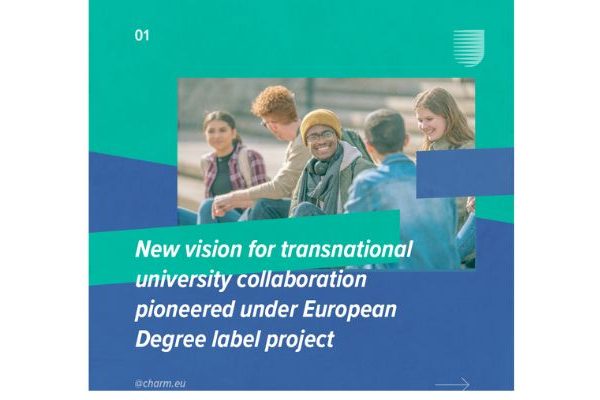A Europe-wide consortium of six university alliances has secured the European Commission’s support for ED-AFFICHE, their joint proposal to pilot the European Degree label funded by the Erasmus+ programme.

This unprecedented collaboration among European University Alliances will enable CHARM-EU Una Europa, 4EU+, EC2U, EU-CONEXUS and Unite! to make bold steps towards realising the transformative potential of the European Degree label. Pooling their collective expertise, the consortium will seek to improve the process of developing joint degrees as a central strand of the project.
“We saw potential in this call to pilot the European Degree label that goes beyond the immediate objectives of this policy initiative and the lifetime of the project. With this powerhouse of a consortium, we hope to bring about tangible progress towards our common aim of making the development and implementation of joint degrees in Europe a less complex and resource-intensive undertaking. We aim to achieve meaningful impact for all types of universities across the European Higher Education Area”, says Professor Luc Sels, Rector of KU Leuven, representing Una Europa in this project consortium.
The project applicants represent a diverse and high-powered consortium that unites a total of 51 higher education institutions from 22 different countries across the European continent. It is supported by 18 national and regional ministries in charge of higher education, as well as key players in the area of higher education, accreditation and quality assurance. The participating universities are deeply rooted in their respective ecosystems, have a long tradition of international collaboration and a strong track record in the development of joint programmes. Together, the universities represent a combined student and staff body of nearly 2 million people. This community of students, professionals and academic staff will be actively empowered to take part in the project activities.
“The European University Alliances are a natural test-bed for the next generation of joint programmes. The Joint European Degree Label could be a game-changer, but only if accompanied by the will of relevant member states’ decision makers to further harmonize their higher education systems and progressively remove the many obstacles that European universities face”, said Anders Söderholm, President of KTH Royal Institute of Technology, Member of Unite! Alliance.
Over the course of one year, the project consortium will take a comprehensive look at the state of joint programmes, conduct an in-depth mapping exercise on its extensive portfolio, and organise strategic activities both at national and European levels to facilitate an open dialogue between universities and their national/ regional legislators. The consortium aims to gain further insights into the most pressing challenges that exist in the development of joint programmes today and initiate the exchange of best practice at European level. It is this process of mutual learning between stakeholders across Europe that may ultimately lead to the development of transnational strategies to overcome these hurdles.
“This pilot will not only enable the European Universities Initiative to test the European Degree label, it will strengthen collaboration sought by the European Council: collaboration between European Universities, Member States and the European Commission in co-creating the European Education Area of the future. The consortium’s vision for the pilot advances collaborative links with Member States that have been established in the Initiative’s first three years. Spain, who will hold the European Council Presidency later this year, is a shining example of this collaboration”, highlighted Dr Joan Guàrdia Olmos, Rector of the University of Barcelona, Member of CHARM-EU.
The project consortium sees the European Degree label as a unique vehicle for boosting transnational collaboration in European higher education more broadly, which is crucial to positively impact the attractiveness and competitiveness of the European Higher Education sector on the world stage.